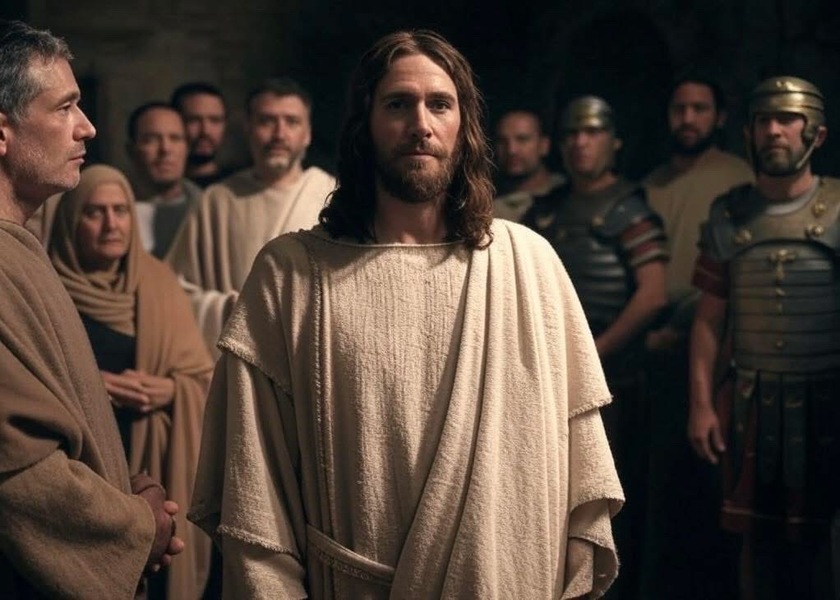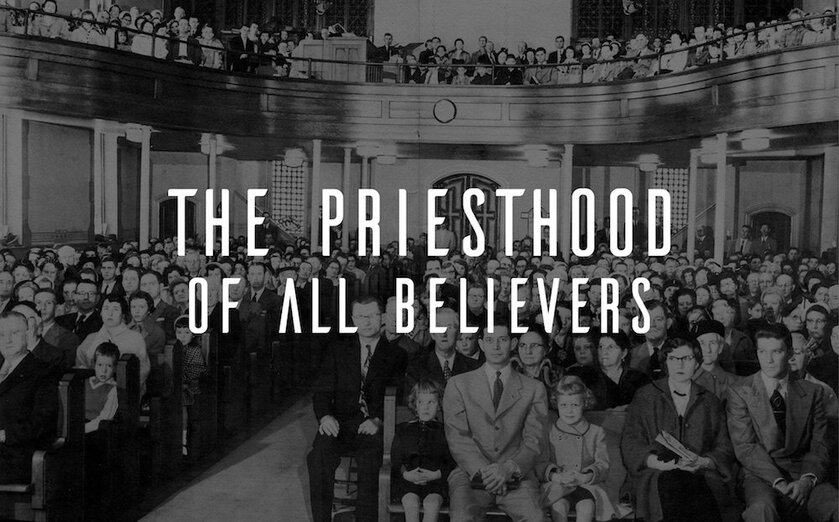Truth on Trial: When Lies Prevail, Yet Hope Endures
Luke 23:1-2
Then the whole company of them arose and brought him before Pilate. And they began to accuse him, saying, "We found this man misleading our nation and forbidding us to give tribute to Caesar, and saying that he himself is Christ, a king."
They accused Jesus of blasphemy, claiming to be the Son of God. But when they brought him before Pilate they didn't charge him with that. The religious leaders initially condemned Jesus for blasphemy because He claimed to be the Son of God (Mark 14:61-64; Matthew 26:63-66), which they saw as a direct challenge to their theological authority and a violation of Jewish law (Leviticus 24:16). That charge, however, wouldn’t hold much weight with Pilate, a Roman governor who cared little about Jewish religious disputes and was focused on maintaining political order.
They reframed their accusations to appeal to Roman concerns. They charged Him with misleading the nation, forbidding tribute to Caesar, and claiming to be a king; implying He was a revolutionary threatening Roman rule. As I'm writing this, I'm thinking about the so called J6 committee and the lies they told to drum up false allegations against protesting patriots. I see a lot of similarities.
This was a calculated move by the priests to make Jesus’ fate a matter of Roman law, where claiming kingship could be construed as treason against Caesar (John 19:12). This way they could achieve their ultimate goal of having Jesus put to death. They were hell bent on his destruction.
Their goal was clear: manipulate the system to ensure Jesus’ death, regardless of the truth. There’s a sense of truth being sidelined for political or ideological ends. Yet, Jesus’ response is striking: He doesn’t engage in self-defense or retaliation, but trusts God’s plan, even as the accusations pile up.
Luke 23:3
And Pilate asked him, "Are you the King of the Jews?" And he answered him, "You have said so."
In Greek, the phrase (σὺ εἶπας, su eipas) carries a nuanced tone, often interpreted as, "Those are your words," or "You say it." In our language it would be like someone saying, "You said it". A true statement of affirmation. He’s saying, "That’s your phrasing, not mine, but there’s truth in it."
Jesus is simply distancing himself from the political implications of that statement. He’s not a revolutionary vying for Caesar’s throne. Jesus’ careful response keeps the focus on the truth without getting trapped in their misrepresentation. It’s like Jesus is letting Pilate’s words hang in the air, inviting deeper reflection rather than escalating the confrontation.
Luke 23:4-5
Then Pilate said to the chief priests and the crowds, "I find no guilt in this man." But they were urgent, saying, "He stirs up the people, teaching throughout all Judea, from Galilee even to this place."
Pilate, likely skeptical of the leaders’ motives, sees through their accusations (misleading the nation, forbidding tribute, claiming kingship, per Luke 23:2) and finds no evidence of sedition or treason. This is significant because it aligns with the historical Pilate’s primary concern: maintaining order, not meddling in Jewish religious disputes. But the priests are snakes and they continue to make hay out of the noise. It’s another calculated move, especially since "stirs up" (ἀνασείει, anaseiei) suggests shaking things up, implying chaos without concrete evidence of rebellion. Again we see a correlation with recent events. They gin up what we call "false flags" to give the semblance of rioting. It’s a tactic to keep the pressure on Pilate, exploiting his fear of unrest. Notice they don’t bring up blasphemy again, not until he's on the cross.
In both cases, in Jesus' trial and during the J6 hearings, the goal is to leverage fear and optics over evidence. The priests’ urgency ("they were urgent," ἐνίσχυον) shows their desperation to drown out Pilate’s verdict with noise, much like we saw being "ginned up" to obscure the truth of what happened at the U.S. Capital.
This could invite reflection on how we discern truth when accusations fly, whether in Jesus’ trial or during today’s controversies. How should we view things? How should we respond or react? Should we do or say anything at all?
What did Jesus do?
Pilate learns that Jesus is under the governance of Herod, so he sends him to him to be judged, thinking he found a way to be rid of this corrupt kangaroo court.
Luke 23:8-9
When Herod saw Jesus, he was very glad, for he had long desired to see him, because he had heard about him, and he was hoping to see some sign done by him. So, he questioned him at some length, but he made no answer.
This is the same Herod who beheaded his cousin John the Baptist. A detail that underscores his moral bankruptcy and curiosity-driven interest rather than any pursuit of the truth.
When Jesus arrives before Herod (Luke 23:8-9), we’re told Herod is "very glad" because he’s heard of Jesus and hopes to see a miracle, almost like Jesus is a traveling performer for his amusement. But Jesus’ response is stark; he made no answer. Not a single word.
The fact of the matter is, the people hate the truth. Jesus could speak right now. He could lay out ABSOLUTE truth and make perfect statements and perfect sense and it wouldn't change a thing. Because everyone lies and they love it that way. Even if Jesus laid out flawless arguments, the crowd’s love for their version of reality; where power, control, or convenience reigns, often drowns out clarity. They would just agree to disagree, establish boundaries and move on doing business as usual. This isn’t just Herod or the priests; it’s a human tendency.
John 3:19 captures it:
"People loved the darkness rather than the light because their works were evil."
Jesus, who is truth (John 14:6), stands silently, knowing words won’t pierce hearts that are set against Him.
Now think back to Jeremiah who ministered to Judah in a time of rampant idolatry, corruption, and denial, just before Babylon’s conquest (late 7th to early 6th century BC). The people and their leaders rejected God’s warnings, preferring lies that propped up their false security.
Jeremiah 5:1-3 paints a grim picture:
"Run to and fro through the streets of Jerusalem…seek…for a man…who does justice and seeks truth…but they have refused to take correction. They have made their faces harder than rock; they have refused to repent."
Sound familiar?
Like the priests in Luke 23, Judah’s people loved the fact that everyone lies over God’s call to truth.
Jeremiah 8:8-9 is even more pointed:
"How can you say, ‘We are wise, and the law of the Lord is with us’? But behold, the lying pen of the scribes has made it into a lie. The wise men…have rejected the word of the Lord."
The leaders then twisted truth to suit their ends, much like the priests reframed Jesus’ teachings as sedition (Luke 23:2, 5). Jeremiah faced the same resistance.
Everyone lies and they love it that way is my own words against the world, and it's a cry against a world that often mirrors Jeremiah’s and Jesus’ times. I mentioned the J6 events before, seeing parallels in how narratives get "ginned up" to obscure truth, much like the priests’ accusations. Whether it’s media, politics, or personal interactions, the preference for convenient lies over hard truth can feel overwhelming. It’s as if people, like Herod, demand a show rather than face reality, or, like the priests, cling to stories that justify their goals.
Is there still hope?
Is there a faithfulness somewhere in the world?
Scripture shows this isn’t universal or final. Jeremiah did find a remnant who listened (like Baruch, Jeremiah 36:4), and Jesus’ truth pierced hearts like the thief on the cross (Luke 23:40-43). Here and there a few will come to the truth.
The lesson to learn from this is to keep seeking and speaking the truth. Jeremiah was brought to tears in his frustration with Israel, but he kept speaking, not because everyone would turn, but because God’s truth mattered, and some would hear it.
Earlier we asked, "What did Jesus do?" In Luke 23:8-9, He stayed silent before Herod, recognizing a heart too calloused for words. But His silence wasn’t His whole story. Before this, He taught openly, and confronted hypocrisy face to face (Matthew 23). Even while being openly rejected he continued to love and pray for his accusers. His silence here was strategic, saving words for when they’d bear fruit, like with Pilate later (John 19:11) or His disciples post-resurrection.
Don't despair the obstacles. Jesus saw Herod’s heart and didn’t waste his breath. Jeremiah saw Judah’s faithlessness but still spoke. Recognize when people cling to lies (like the priests’ "stirring up" charges or today’s distortions and propaganda), but don’t let it crush you.
In John 16:33 Jesus says,
"In the world you will have tribulation. But take heart; I have overcome the world."
Truth wins, even if it’s scorned now.
Pray for eyes to open, for ears to hear, and hearts to change. Hold fast to your hope in Christ's name, God’s truth endures.
Isaiah 40:8
"The grass withers and the flowers fall, but the word of our God endures forever."




















